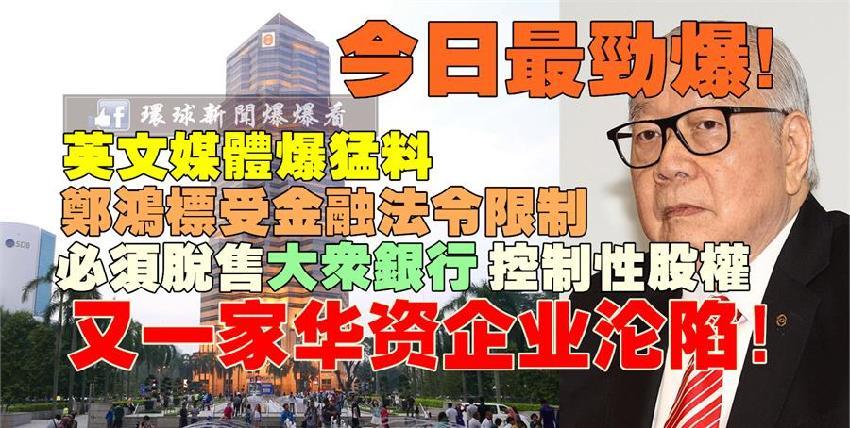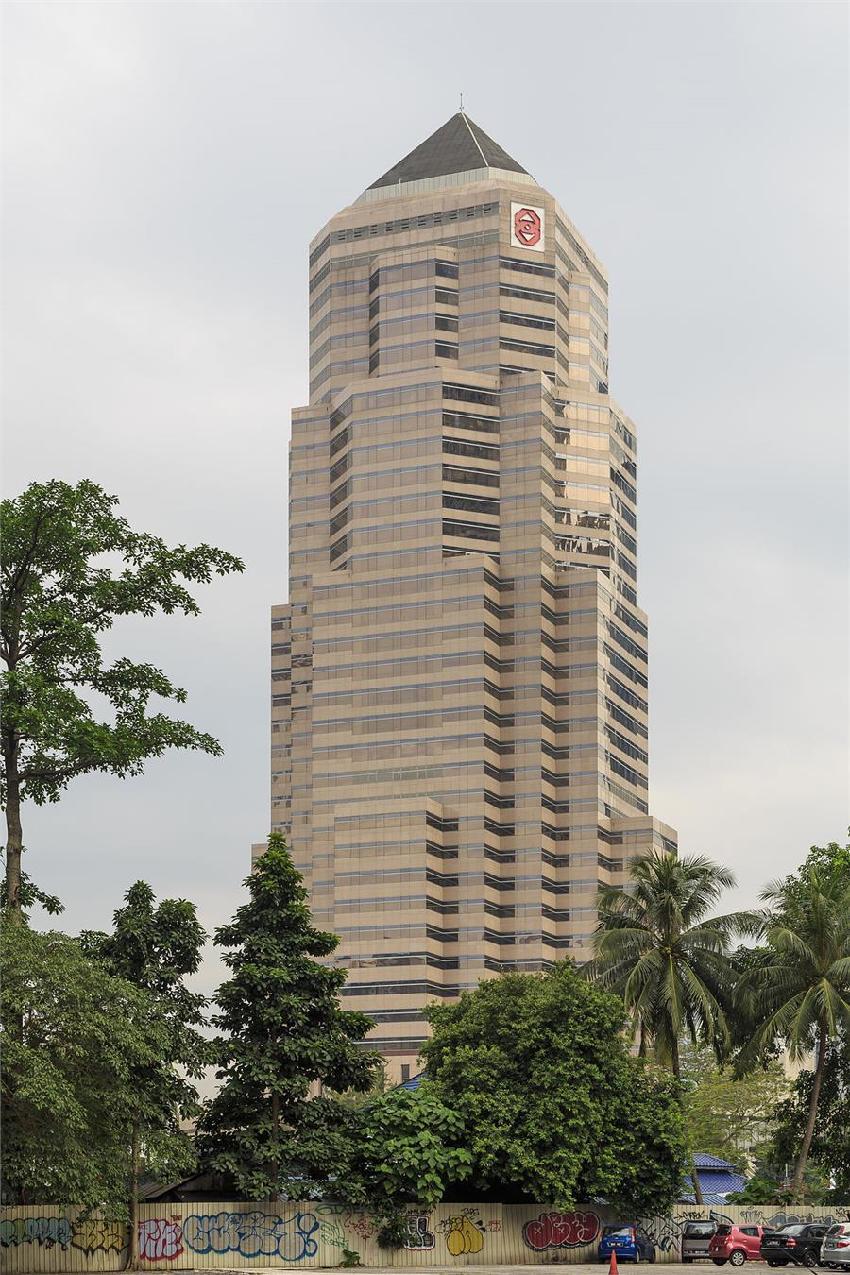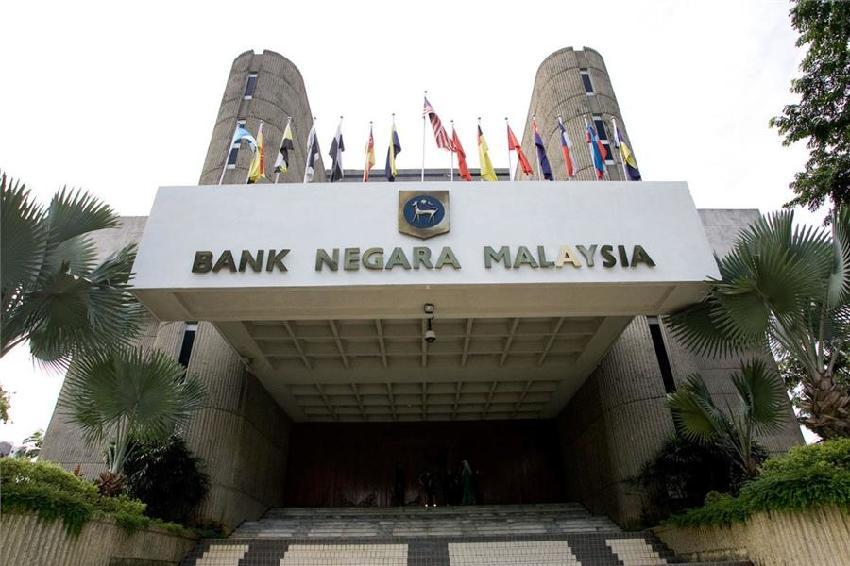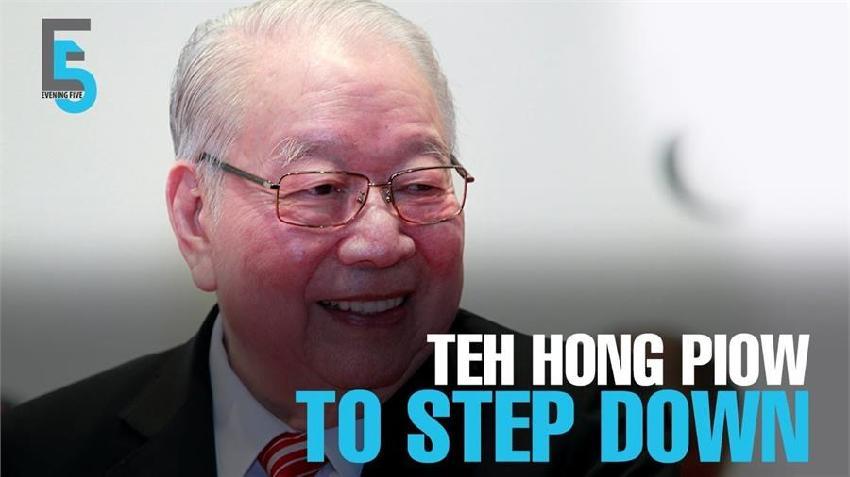最勁爆!又一家大型華資企業淪陷?丹斯里鄭鴻標創辦的大眾銀行,即將落入馬來土著手中?

廣告-請繼續往下閱讀
今日最勁爆!又一家大型華資企業淪陷?丹斯里鄭鴻標創辦的大眾銀行,即將落入馬來土著手中?
英文星報《The Star》今日在一篇專題報導中引述金融專家的言論指出,今年已高齡88歲的丹斯里鄭鴻標將在今年底正式引退。按照大馬金融法令規定,他個人名下的23.4%大眾銀行股權,必須脫售至少13.4%!

廣告-請繼續往下閱讀
這意味著,丹斯里鄭鴻標雖然仍能保持作為大眾銀行最大的單一個人股東,但是他也將失去大眾銀行的實際控制權!
而任何有意收購丹斯里鄭鴻標13.4%股權的金融企業,必須事先獲得國家銀行批准,才能商談收購事宜。沒有得到國家銀行首肯,任何個人或金融公司都不能染指大眾銀行股權。
以國內目前的經濟政策來看,鄭鴻目標13.4%股權,最大可能就是落入政府官聯公司手中。也就是說,大眾銀行控制權落入馬來土著手中,似乎已經是無可避免的了。

廣告-請繼續往下閱讀
這既是說,一旦丹斯里鄭鴻標退休后,他必須根據大馬金融法令規定,即個人擁有銀行股權不得超過10%的條例,而被迫變賣他手中的大部分股權。
大馬金融法令也規定,超過限額的股權,一旦持有者退休之後,就算他的家族有接班人,最多也只能轉讓10%股權,超過這個數額的就必須脫售。
按照目前大眾銀行的市值,丹斯里鄭鴻標持有23.4%股權,總值為215.5億令吉。任何人慾收購他手中13.4%股權,就必須拿出大約130億令吉的代價。除非鄭鴻標不願放棄最後的10%股權,否則若悉數脫售的話,他將能套現200多億令吉。

廣告-請繼續往下閱讀
一些金融專家可能認為,丹斯里鄭鴻標實際上還有第三種選擇,那就是成立家族信託基金,然後將所有23.4%大眾銀行股權轉為信託;那就可以長久持有股權,不必擔心被他人鯨吞。
但是,根據了解,大馬金融法令也有明文規定不可這麼做。
總而言之,丹斯里鄭鴻標一旦退休,他將別無選擇,只能脫售至少13.4%股權給其他金融機構。
內容未完結,請點擊「第2頁」繼續瀏覽。
文章部分內容來源於網路,如果侵犯到您的隱私、權益、請點擊檢舉按鈕舉報,網站將在第一時間進行處理,謝謝合作! 檢舉
事實上,馬來西亞的銀行業如今只剩下兩家華資控制的銀行,除了大眾銀行之外,另一家是丹斯里郭令燦控制的豐隆銀行。由於丹斯里郭令燦也面對與鄭鴻標一樣的處境(手上控制著豐隆銀行60%股權,遠遠超過國家銀行的規定),豐隆收購大眾的可能性不大。
廣告-請繼續往下閱讀

企業界一般認為,最有可能收購大眾銀行的,將會是大馬最大的馬銀行Maybank或排名第二的聯昌銀行CIMB。當然,不排除也有外國金融企業對大眾銀行感興趣;但一切都得看國家銀行的決定。
換句話說,當丹斯里鄭鴻標去年底宣布2018年底正式引退之後,實際上大眾銀行的話語權就已經落在國家銀行手中了。
丹斯里鄭鴻標雖然有兒有女,但卻沒有一個願意接收父親的領導棒子。據悉,鄭鴻標有一個女兒目前在美國金融企業擔任高職,她已經明確表態不願接棒領導大眾銀行。

目前大眾銀行的行政管理權是由鄭鴻標指定的管理團隊共同負責,領導這個管理團隊的,是跟隨丹斯里鄭鴻標40多年的丹斯里鄭雅力Tan Sri Teh Ah Lek。
Who really controls Public Bank?
The almost instant answer that popped up was – Tan Sri Teh Hong Piow. That was the obvious owner, considering the billionaire banker owns 23.4% of the third-largest bank in the country and was worth some RM21.55bil as of the end of last year.
However, by the time the dinner was over with an empty bottle of whisky, the group of bankers agreed that the real owner of Public Bank was Bank Negara.
Why Bank Negara?
Because the central bank keeps a close watch on the banking industry and is the regulator that approves shareholders of the financial institutions – all for good reason. In some ways, it has a rein on the shareholding changes in Public Bank.
Teh is 88 years old and does not seem to have a successor to run his banking outfit. At the moment, a team of seasoned bankers who have been with Teh for many years manage the bank.
Teh does not handle the day-to-day matters. He only looks at the 「bigger picture」 – which is actually a very big one if one were to look at how the bank』s shareholding will be resolved in the years to come.
With some 23.4% under his name, Teh is one of the few individuals allowed to hold more than 10% in a financial institution.
Under the Banking and Financial Institution Act (Bafia), individuals are only allowed to hold up to 10% in financial institutions. However, the bankers are allowed to hold a bigger stake in their banks due to a rule termed as the 「grandfather rule」 where individuals who have been holding interest in banks for a long time are exempted from complying with the Bafia.
But this rule only applies to the individuals. It is not a privilege extended to their children.
This leaves the owners with a problem – how do they pass on their wealth to the next generation or keep it intact so that their legacy will remain.
Bankers familiar with the issues of succession in financial institutions say that these tycoons are not even allowed to move their shareholding to a trust.
However, the problem lies with the stakes held by Teh. He have little choice but to gradually reduce his stakes. And when that happens, the regulator has a big say in who emerges as the new substantial shareholder.
So, is it correct to say that Bank Negara has a big say on who controls Public Bank? On paper, the central bank is definitely not the owner and has said that it does not dictate terms.
